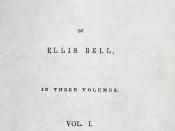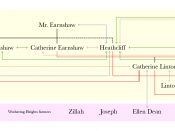Wuthering Heights is, according to Suzan Gubar, a cultural construct, and therefore culture wins over nature, as always is the case in such duels. These are, in fact, duels of female flesh and male spirit, female earth and male sky, female monsters and male angels. What is needed in society is to suppress and exorcise these irrational, that is female representatives of nature. The "female rage" therefore becomes the central theme of the novel. Catherine is the raging female in Wuthering Heights, who "fell" as a result of her tasting the "poisonous food of culture". The product of this taste of education is here, unlike the triumphant self-discovery in the male Bildungsroman, anxious self-denial. As Catherine doesn't even know her name, she cannot know who she is or what she is destined to be. Not only do women have to "fall", but they are, due too patriarchal nature of culture, already fallen because they are doomed to do so.
There is, as she points out no great difference between "falling" and falling in love, and as a result, women seem to be at the mercy of all men. Just like Catherine and Isabella they all must suffer or even die.
I must admit that upon reading her arguments I was rather shocked with some of her suggestions, however it woke up my curiosity, so I tried to look into it a bit more thoroughly. Having read it again I found that the segments which show her attitude most clearly are the ones which have to do with Catherine, Heathcliff and the Catherine Heathcliff relationship. Therefore, I shall next try to sum up the arguments that affected me most.
She first made it clear that Wuthering Heights is, in fact, a coexistence of opposites, a place where hell can become...


